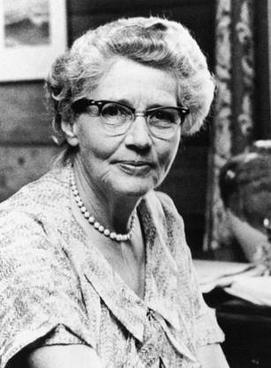Helen B. Taussig
Helen Brooke Taussig (May 24, 1898 – May 20, 1986) was an American cardiologist and a founder of the field of pediatric cardiology. She is best known for her work in developing the Blalock-Thomas-Taussig shunt, a surgical procedure that has saved the lives of countless infants with tetralogy of Fallot, a congenital heart defect.
Early Life and Education[edit | edit source]
Helen B. Taussig was born in Cambridge, Massachusetts, to Frank W. Taussig, a prominent economist, and Edith Guild Taussig, one of the first female graduates of Radcliffe College. Despite suffering from severe dyslexia and later becoming deaf, Taussig excelled academically. She attended Radcliffe College and later transferred to the University of California, Berkeley, where she earned her bachelor's degree. She then attended Harvard Medical School but was not awarded a degree because the institution did not grant degrees to women at that time. She completed her medical degree at Johns Hopkins School of Medicine in 1927.
Career[edit | edit source]
After completing her medical degree, Taussig joined the Johns Hopkins Hospital as a cardiologist. She worked under the mentorship of Dr. Maude Abbott, a pioneer in the field of congenital heart disease. Taussig's groundbreaking work focused on "blue baby syndrome," a condition caused by tetralogy of Fallot.
In collaboration with surgeon Alfred Blalock and laboratory technician Vivien Thomas, Taussig developed the Blalock-Thomas-Taussig shunt in 1944. This procedure involves connecting the subclavian artery to the pulmonary artery to increase blood flow to the lungs, thereby alleviating the symptoms of cyanosis in infants.
Contributions and Legacy[edit | edit source]
Helen B. Taussig's contributions to medicine extend beyond the Blalock-Thomas-Taussig shunt. She was instrumental in the campaign against the use of the drug thalidomide in pregnant women, which was found to cause severe birth defects. Her advocacy led to stricter drug regulations in the United States.
Taussig received numerous awards and honors throughout her career, including the Lasker-DeBakey Clinical Medical Research Award in 1954 and the Presidential Medal of Freedom in 1964. She was also the first female president of the American Heart Association.
Personal Life[edit | edit source]
Despite her professional success, Taussig faced numerous personal challenges, including her battle with dyslexia and progressive hearing loss. She learned to read lips and used amplified stethoscopes to continue her work in cardiology.
Death[edit | edit source]
Helen B. Taussig passed away on May 20, 1986, in Kennett Square, Pennsylvania, following an automobile accident. Her legacy continues to inspire generations of medical professionals and researchers.
See Also[edit | edit source]
- Blalock-Thomas-Taussig shunt
- Tetralogy of Fallot
- Vivien Thomas
- Alfred Blalock
- Johns Hopkins Hospital
- American Heart Association
References[edit | edit source]
External Links[edit | edit source]
Translate: - East Asian
中文,
日本,
한국어,
South Asian
हिन्दी,
தமிழ்,
తెలుగు,
Urdu,
ಕನ್ನಡ,
Southeast Asian
Indonesian,
Vietnamese,
Thai,
မြန်မာဘာသာ,
বাংলা
European
español,
Deutsch,
français,
Greek,
português do Brasil,
polski,
română,
русский,
Nederlands,
norsk,
svenska,
suomi,
Italian
Middle Eastern & African
عربى,
Turkish,
Persian,
Hebrew,
Afrikaans,
isiZulu,
Kiswahili,
Other
Bulgarian,
Hungarian,
Czech,
Swedish,
മലയാളം,
मराठी,
ਪੰਜਾਬੀ,
ગુજરાતી,
Portuguese,
Ukrainian
Navigation: Wellness - Encyclopedia - Health topics - Disease Index - Drugs - World Directory - Gray's Anatomy - Keto diet - Recipes
Search WikiMD
Ad.Tired of being Overweight? Try W8MD's physician weight loss program.
Semaglutide (Ozempic / Wegovy and Tirzepatide (Mounjaro / Zepbound) available.
Advertise on WikiMD
WikiMD is not a substitute for professional medical advice. See full disclaimer.
Credits:Most images are courtesy of Wikimedia commons, and templates Wikipedia, licensed under CC BY SA or similar.- 1898 births
- 1986 deaths
- American cardiologists
- Women cardiologists
- Johns Hopkins University faculty
- Recipients of the Presidential Medal of Freedom
- People from Cambridge, Massachusetts
- Radcliffe College alumni
- University of California, Berkeley alumni
- Johns Hopkins School of Medicine alumni
- American medical researchers
- Women medical researchers
- 20th-century American women scientists
- 20th-century American physicians
- Medicine stubs
- Encyclopedia
Contributors: Prab R. Tumpati, MD

